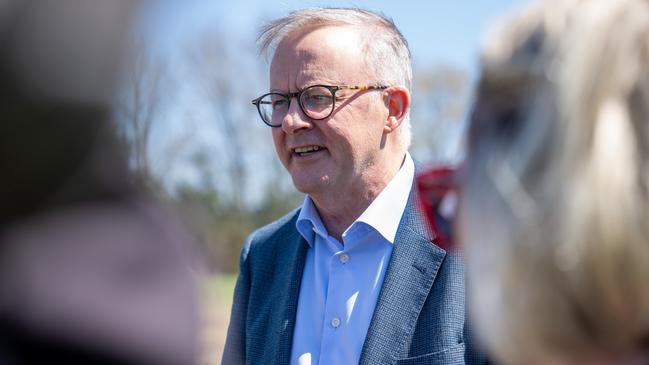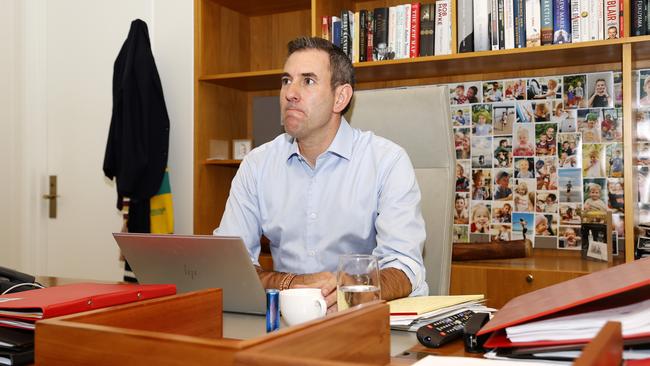Budget much ado about nothing and a political charade
Jim Chalmers gets to hold a practice budget before the real thing next year, ironing out any kinks in his performance. There will be minor nips and tucks, but it will mainly be forecast updates.

In politics timing is everything and people are thinking about their summer holidays by then. But a late October mini-budget gives Labor the chance to riff off its contents for the remainder of the parliamentary year. Building momentum ahead of the real deal next May.
By handing down a second 2022 budget Labor can purport to deliver its first budget as a new government six months after winning office, rather than 12, taking ownership of the economy. It also gets to charge $2000 a head for corporates to attend the budget dinner (a nice little fundraiser), before doing the same again come May.
Jim Chalmers gets to hold a practice budget before the real thing next year, ironing out any kinks in his performance. There will be minor nips and tucks to the budget come Tuesday, but the main findings will simply be forecast updates, just like December’s update provides.
But the new government is keen to use those updates to build a narrative around what comes next, which it hopes to announce in the budget in May. The government’s brains trust is cognisant it doesn’t want its first proper budget next year to miss the opportunity to set up the economic parameters the new government will live or die by.
The PM recently told me “I think people have conflict fatigue” after the past few years, which is a good indicator Tuesday’s practice budget won’t be calibrated to risk adding to that. He also made the point: “I am determined to lead a long-term Labor government and entrench reforms. My experience of what I believe were good governments led by Kevin Rudd and Julia Gillard is that some of the good work that was done was easily undone because it wasn’t entrenched. That idea of permanent change is important to me.”
In other words, Albanese doesn’t want to achieve outcomes he can’t bed down with election victories. Anything his government looks to achieve will be calculated against its capacity to win the argument at the following election. This is sound politics and an indication Albanese won’t let colleagues shoehorn him into policy scripts that risk the electoral viability of his government.
Which is why Albanese was quick to rule out repealing the stage three tax cuts this year even though with Greens support he has the numbers to do so. Also pointing out that they don’t take effect until mid-2024: plenty of time to build the case for change, if change can be achieved without risking fatal political blowback.

That spin has already started. On Thursday the Treasurer used a radio interview to point out that the legislated stage three tax cuts are now expected to cost the budget $254bn over nine years, not $243bn as initially forecast.
Naturally the interviewer’s follow-up question was “are you alarmed by the increase?”, to which the Treasurer responded: “I think it’s been clear to everyone … that these tax cuts make an impact on the budget.”
Indeed they do, but so do higher inflation numbers. It is profoundly disingenuous to blurt out the additional cost of the tax cuts in the updated forecasts without also providing details on the net fiscal impact of the same parameter variations driving the change.
Additional gross revenue as a result of higher inflation would calculate as a massive positive net effect on the budget bottom line, compared to the lower inflation assumptions contained in the 2019 forecasts. And let’s not forget an $11bn adjustment over a decade isn’t as large as it sounds when you focus on the figure not the time frame.
But that reality doesn’t suit Chalmers as he seeks to lay the groundwork for breaking his promise not to mess with the legislated stage three tax cuts. The Treasurer wasn’t asked what was driving the change in the forecasts, probably because the interviewer isn’t proficient in economics. And Chalmers is also waging a guerrilla war with his Prime Minister, who blindsided Chalmers when he strongly ruled out changes to stage three cuts only recently.
Anthony Albanese knows his left flank expects him to adjust the stage three tax mix, but he’s also conscious doing so will represent a broken promise. Hence he isn’t prepared to rush into such action. Chalmers, on the other hand, knows his KPI is the budget, and junking stage three cuts will help him look like a good economic manager bringing the budget back under control.
Without income tax cuts a high inflationary environment would see huge bracket creep consequences for many taxpayers, remembering that Australia is already a nation over-reliant on income taxes compared with consumption and wealth taxes. Our tax mix is horrifically imbalanced and in need of reform.
And don’t forget that unlike in some other parts of the world, Australia’s income tax system doesn’t automatically adjust for changes in CPI, which would avoid people going backwards even when the government does nothing to change the tax system. This has long been the lazy way governments “fix” the budget – leaning in on bracket creep.
To be sure, without income tax relief as legislated in a high inflationary environment more Australians will soon pay higher rates of tax as they see their wages jump into higher tax brackets. Tax cuts are important to help ease cost-of-living pressures because without them people fall behind in their effort to cover higher living costs.
There also seems to be a failure in this debate to understand that stage three income tax cuts are the final part of an elongated approach to tax relief. While plenty of people are jumping up and down complaining the changes within stage three favour middle- and higher-income earners, that’s because the already enacted staged one and two cuts favoured lower-income earners.
If stage three is repealed and adjusted to also favour low-income earners, the burgeoning middle class of taxpayers will once again lose out. Quite apart from the simple fact the government made a promise at the election not to adjust stage three.
Don’t get me wrong, politicians can change their minds, but they are accountable for broken promises. I argued against these tax changes when they were first announced by the Coalition back in 2018. I said Labor shouldn’t stand by them during the campaign. My concern was that a single tax bracket for earnings from $45k-$200k was too flat for our supposedly egalitarian society.
But any changes now should only happen in conjunction with wider reform, also recognising that doing so is a broken promise.
Peter van Onselen is professor of politics and public policy at the University of Western Australia and Griffith University.




Tuesday’s budget will be much ado about nothing. It isn’t a budget in the true sense of the word. Rather, it is a political charade designed to catch people’s attention, something the mid-financial year update released in December doesn’t do.